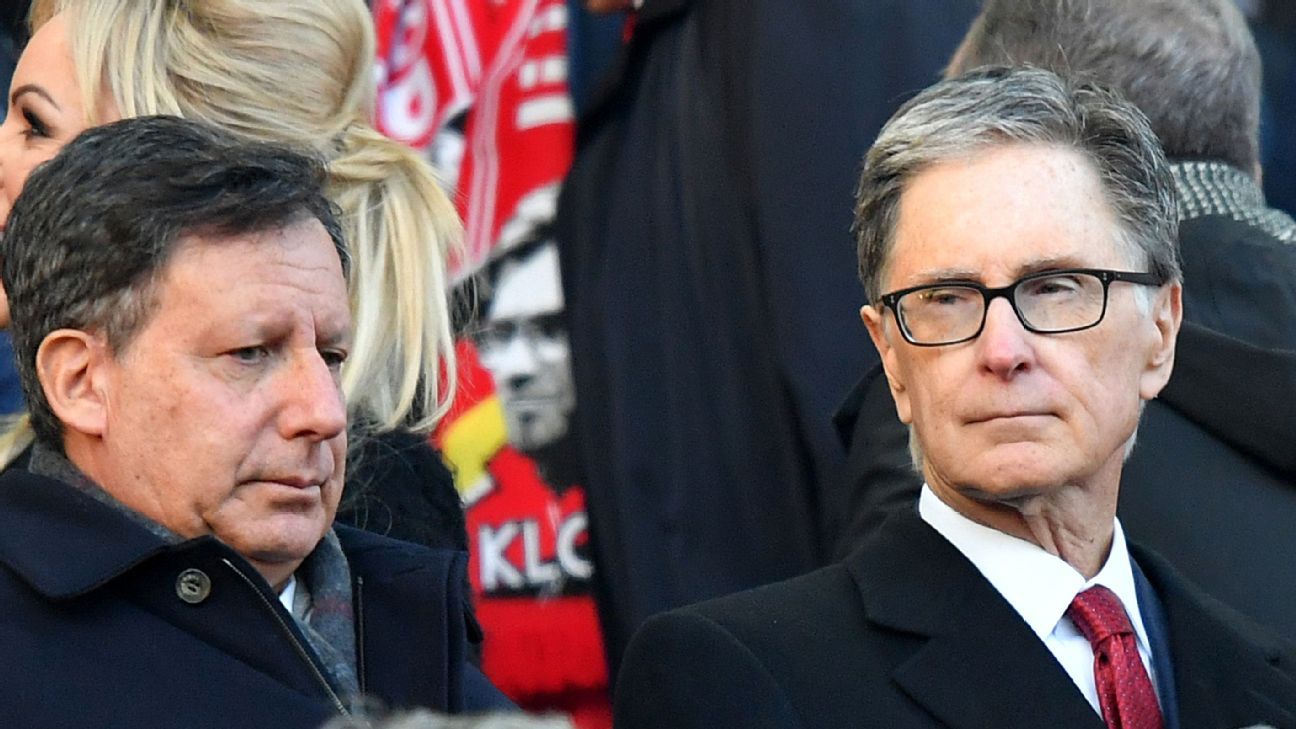Liverpool are not for sale, which is bad news for whoever paid for a plane to fly over Anfield ahead of Sunday’s Premier League match against Manchester United carrying a protest banner that declared: “FSG Out — Klopp In — Enough Is Enough.”
The timing of the stunt probably couldn’t have been much worse. The subsequent 7-0 dismantling of United, Liverpool’s biggest rivals, made the plane protest seem like the wrong idea at the wrong time.
– Stream on ESPN+: LaLiga, Bundesliga, more (U.S.)
Earlier this week, John W. Henry, Liverpool’s principal owner, told the Liverpool Echo that his Fenway Sports Group’s (FSG) commitment was “stronger than ever,” despite an ongoing search for outside investment in the club. But, for some fans, FSG is holding Liverpool back and the time has come for new owners. It raises the question as to who, or what, are now deemed to be the perfect owners of football clubs by their supporters.
FSG has certainly made mistakes since taking charge at Anfield in October 2010 — backing the European Super League project and attempting to raise ticket prices without consulting fans have been two of their biggest errors — but it has also transformed and revived one of football’s most historic clubs through smart management and by hiring the best people to play out their vision.
Liverpool were on the brink of bankruptcy and maybe even liquidation when FSG, under the guise of New England Sports Ventures, bought the club for £300 million from previous owners Tom Hicks and George Gillett. Back then, Liverpool had gone 20 years without a league title, and although the club won the Champions League in 2005 they had been left behind by Manchester United, Chelsea and an emerging Manchester City.
There were some early missteps after taking charge at Anfield, such as the £35m club-record signing of Andy Carroll in their first transfer window at the helm. But from the moment FSG appointed Jurgen Klopp as manager in October 2015, to work in tandem with sporting director Michael Edwards, the vision of running a major football club in a sustainable but successful manner has been borne out.
Liverpool have spent big, but also wisely. Before making Virgil van Dijk (£75m) and Alisson (£56m) respectively the world’s most expensive defender and goalkeeper at the time in 2018, FSG backed the judgement of Edwards, head of recruitment Dave Fallows and the club’s data analytics team when making midrange investments in Mohamed Salah (£34m from AS Roma), Georginio Wijnaldum (£25m, Newcastle United), Sadio Mane (£30m, Southampton) and Andy Robertson (£8m, Hull City).
Yet the numbers show that, since their first transfer window in January 2011, only six clubs in Europe (Chelsea, Man City, Barcelona, Man United, Juventus and Paris Saint-Germain) have spent more on players than Liverpool under FSG. Liverpool have spent £1.17 billion — almost £800m less than City and £900m less than Chelsea. In addition to the outlay on players, FSG have invested £220m in upgrading Anfield with two new stands and the construction of a new training ground.
The return on the spending has been Liverpool’s most successful period in over 30 years; success in every competition bar the Europa League, including a first domestic league title since 1990, and one win in three Champions League finals between 2018 and 2022. Yet still, a minority of Liverpool supporters believe that the club needs new owners to take them to the next level.
But here’s the inconvenient truth about football club owners: There is no such thing as the perfect one.
Maybe Man City fans will argue that Sheikh Mansour bin Zayed al Nahyan is the definition of an ideal owner having invested over £3bn in the club, on and off the pitch, since September 2008. But if the Abu Dhabi hierarchy are found guilty of some, or all, of the 115 charges of financial wrongdoing recently laid down on them by the Premier League, which City deny, the consequences for the club could be catastrophic. If that happens, will the tarnishing of the club’s name have been worth it?
Across Manchester, United fans have attempted drive out the Glazers as owners ever since the American family plunged the club into more than £500m of debt when buying the team in May 2005. A number of poor decisions and appointments since Sir Alex Ferguson’s retirement as manager in 2013 sent United into a downward spiral and, at the same time, a lack of investment in Old Trafford has left the club with an ageing and tired stadium that still has a leaking roof.
Tottenham Hotspur fans have a great stadium to watch their team play in, but they continue to want new owners due to repeated failures on the pitch, with Wednesday’s limp Champions League exit to AC Milan the most recent. Just down the road, Arsenal fans have regularly complained about owner Stan Kroenke failing to inject the funds required to make the club competitive against the top teams in the transfer market.
Perhaps some Liverpool fans want the club to be owned by a wealth fund connected to an oil-rich state like Man City, Newcastle (Saudi Arabia) or PSG (Qatar), but all those clubs have been under scrutiny for financial reasons and the human rights issues in the countries of their respective owners.
Yet while FSG is ultimately a group of investors who want a return, they have been able to strike a balance in investing in the club at the same time as growing its value with success on the pitch. They have built a team and rebuilt a stadium, connected with fans’ groups better than most owners of top clubs, and they have been able to keep pace with City when others have failed to do so.
Maybe that still isn’t enough for some, but if FSG is a bad owner in the eyes of supporters, it raises questions as to what fans really want from their clubs in the modern game.
